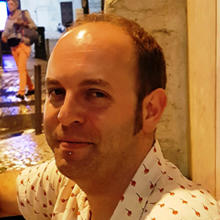An interview with Jonathan Lilburn
March 2019
Jonathan Lilburn is Quality Control Lead at AkzoNobel (Dulux Paints) in Cork, Ireland. Here, he talks about his role, where his interest in microbiology came from and why he joined the Microbiology Society.

Tell us about your current role.
I work as Quality Control Lead at AkzoNobel (Dulux Paints) in Cork. My role primarily involves product testing and release, including maintaining test specifications and standards, and correcting out-of-spec batches. I’m involved in writing standard operating procedures and maintaining and calibrating laboratory equipment. A significant part of my job is testing all our products for microbial contamination. Raw materials and plant infrastructure are monitored and treated for contamination if required. Paint can go off if not protected, and bacterial build-up in tanks or pipework can have massive consequences (some paint factories have had to suspend production and close for days or weeks to deal with contamination issues that had gone un-addressed).
What are the greatest differences between academia and industry?
I have studied at three different universities/colleges in Ireland and Scotland, and for the last 12 years I have worked for the same company, based in Cork but also requiring work at supplier sites elsewhere (mostly in the UK). There is a different atmosphere and a different emphasis in industry compared to academia. One major difference I noticed, especially early on looking for work, is that employers overwhelmingly look for experience over qualification. The AkzoNobel site in Cork is a very old factory. Many employees started out of school and have a long history with the company – up to 40 years. Plenty of people there are related and there are multiple generations of some families.
There is a greater drive towards the practicalities of getting things done (as opposed to background or theory). There can be an attitude of ‘it’s always been done this way’ (I’m not sure if that’s unique to industry), but also pressure to improve processes, and remove waste and non-value-added activity. Finally, there are always customers whose needs and expectations must be met.
Where did your interest in microbiology come from?
I originally intended to study chemistry, but during my first year at university I found microbiology even more interesting, so I changed track and followed up my BSc in Microbiology with a master’s degree in the subject. I was able to do this because I entered university as part of a general science course and was exposed to a broader range of subjects and options for progression than if I had entered a denominated chemistry degree. I would always recommend this approach where possible – don’t commit to a specialisation straight away if you don’t have to.
Why did you join the Society, what is the main benefit for someone not working in research?
I joined the Microbiology Society shortly after I started working. Even though it’s over a decade since I left academia, being a member allows me to stay in touch with research being carried out and keep abreast of developments in the field. I like having this link to my original field of study.
Are you a member and interested in sharing stories about your research journey? Email [email protected]


